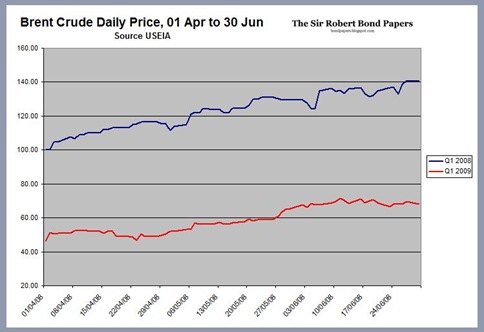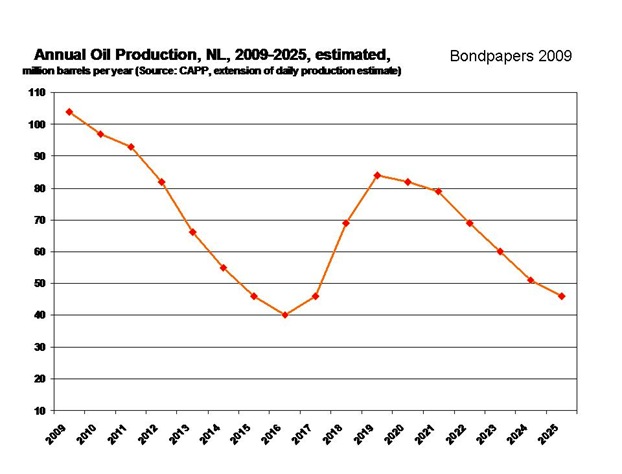The Government of Newfoundland and Labrador forecast
record spending for 2007, at more than $5.5 billion.
Some quick observations based on a simple breakdown into the good, the bad and the ugly of the budget:
The GoodTax cuts and increased program spending.
All good in an election year and make no mistake: this is an election budget.
People will be happy and the provincial government is certainly counting on people's immediate sense of contentment to see the current administration re-elected with an overwhelming majority.
No region of the province is untouched by extra cash. No person will be left out of the tax breaks or other benefits.
The source of the cash: all the supposedly bad deals signed before 2003 by previous administrations, Liberal and Conservative.
Windfalls from high oil prices produced the supposed miracle of deficit slaying. Everything in this budget, indeed every budget increase since 2003 has been based on high oil prices.
Thank you Brian Mulroney and Brian Peckford. Thanks to the administrations that developed Voisey's Bay and the offshore oil fields at Hibernia, Terra Nova and White Rose.
The latter field is expected to hit payout in FY 2007. As a result, royalties will jump to 30% on the price of each barrel.
The BadThis budget forecasts a spending increase 5.6% from Fiscal Year (FY) 2006. It also projects increased spending of 4.7% and 4.2% over the subsequent two fiscal years.
That's bad since it exceeds the rate of inflation by more than double in FY 2007. The
Bank of Canada forecasts inflation to run at 2.2% in 2007 and at 2.7% for each of the two years after.
Prudent fiscal management would hold spending to at most the projected inflation rate. That doesn't mean program spending would need to be curtailed in important areas, nor does it mean the provincial couldn't afford tax cuts to bring provincial rates in line with Atlantic Canada. Rather it would simply require the provincial government to make some clear choices in what it considers important, rather than fix every problem by more spending.
Even in FY 2004 when the current administration proclaimed the province to be in a financial mess, it still introduced a budget that increased spending from the previous year. Spending has increased every year since. That's not going to be sustainable given the absence of a major new development at Hebron, which would have achieved first oil as production from at least two of the other fields slackened.
As it stands currently - and unless there are supersecret talks on Hebron no one is talking about - Hebron won't be producing oil for another decade or more. In the interim, the impact of demographic changes throughout the province will increase pressure on the provincial treasury at a time when the province's coffers will not be seeing significant new cash flowing in.
The current and forecast spending increases are based on optimistic projections for the price of oil in the medium term. Any downward trend in commodity prices (oil, minerals etc) will quickly make the consistent spending increases since 2003 unsustainable. Fiscal reality in those circumstances - taking less money in than is flowing out - would require program cuts, job losses and/or tax increases to correct.
Our plan is to continue this responsible approach in the years that follow to ensure we are increasingly strong, less reliant on the whims of others and more reliant on
ourselves.
The whims referred to are likely those supposed whims of the Government of Canada. This budget - like all recent budgets - builds itself on the whims of international commodities markets. Which one is less reliable?
More bad.
Per capita spending will be $10, 871 per person in the province, assuming a population of 512, 000. It will jump to $11, 878 per person in FY 2008 putting Newfoundland and Labrador on par with Alberta for
per capita provincial government spending. Drop the population below 500,000 and Newfoundland and Labrador will be outspending Alberta, the richest province in the country.
The difference is that Alberta isn't carrying around the
per capita debt Newfoundland and Labrador shoulders, which, as noted below using the finance minister's own words, limits the provincial government's options in dealing with any financial setbacks.
That level of
per capita spending is unsustainable in the long run. As a recent Atlantic Institute for Market Studies
assessment concluded:
If the province fails to reign in its whopping per capita government spending (about $8800/person [in FY 2006]) and super-size me civil service (96 provincial government employees /1000 people) it will quickly erode any gains from increased energy revenues.
The UglyAs much as the provincial government talks about the large public sector debt, so far it hasn't done anything to deal with it.
Finance minister Tom Marshall described the issue accurately in the
budget speech, saying:
The most significant fiscal challenge facing Newfoundland and Labrador is the burden of debt we inherited, the highest per capita net debt in Canada, more than double the national average. High debt loads mean high interest payments, whether for a family or for a government. Reducing debt frees up money to spend on programs and other priorities.
All government has done is produce a net reduction in the debt by a mere $70 million in FY 2006 and forecast a further reduction of $66 million in FY 2007. At that rate - i.e. $70 million per year - the province will be debt free in 2178.
If there is a budget surplus in FY 2007, as currently forecast, most if not all should be committed to reducing the public debt. Anything else is whistling past the graveyard.
Government's reported success in reducing the debt to GDP ratio has come not from strong fiscal management by government but in growth in GDP driven primarily by commodity prices. Lower the GDP - as in a drop in commodity prices - and those apparent gains will vanish.
There's another ugly element in the budget reporting and that is in the misleading presentation of revenue from the 2005 agreement with the Government of Canada. It will not produce additional cash for the treasury in FY 2007 despite the claim by the finance minister that "[w]ithout the 2005 Accord negotiated by our Premier, we would be receiving $305.7 million less than we are getting this year."
In reality, that cash has already been received and spent on shoring up the teachers' pension plan. That was sound financial decision, but the provincial finance minister cannot claim double credit for the money.
Statement I in the FY 2007
Estimates shows the reality. A modest $49 million surplus on current and capital account forecast for FY 2007 becomes a $255 million shortfall once the $305 million from the 2005 cash advance is
deducted.
-30-



